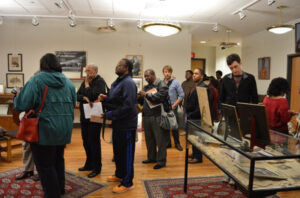
Virtual tours have become the hottest trend among museums all over the country as they cope with the effects of COVID-19. The Meek-Eaton Black Archives Research Center and Museum is no different, and it hopes to join the bandwagon with its latest venture-online museum tours.
For the last six months, the Black Archives, similar to other Florida A&M University facilities, has been closed and as a result student engagement has come to a halt.
However, as officials work to reintroduce on-site tours and open the museum for public use the authorized capacity has been minimized. Only groups of five people or less will be allowed to participate in physical activities in efforts to abate the spread of COVID-19.
Virtual tours, on the contrary, will be accessible to groups of any size and afford more visitors with the opportunity to view the archives even with imposed safety guidelines. Employees at the Black Archives, such as Devante Johnson, are working to finalize the logistics of the tour and expect it to be available for use in two weeks.
“I am finishing the language for our modified virtual tour. It’s already been recorded, I just inserted the language. We chose five different galleries in the museum and had one of our partners to come in and record it (the language),” said Johnson, the program director for the archives.
Johnson will preside over each tour, guide visitors through each exhibit and provide visitors with information relevant to each gallery. The tours will showcase the Carnegie Library, African Art, Slavery and Freedom/Kinsey collection and African Americans in the military gallery.
“We will be posting the tour on our website for the students, other museums and other people in different states and schools to look at,” Johnson added.
The Black Archives, prior to its closure, was considered the cornerstone of history on FAMU’s campus. Students were cognizant of the museum’s addition to their experiences while attending FAMU and had grown to value it.
“I appreciated the history or aspect of the museum,” said Tylia White, a third-year nursing student.
White attended the museum her freshman year she recalled the archive’s vast inventory of artifacts from different historical eras the most.
“I remember they had the gun Harriet Tubman carried at the Black Archives. I also discovered they housed brands of toothpaste that contained racial slurs directed to the African American history,” White said.
Although incoming students will not be able to experience the archives in all of its glory, students, like Lizzie McColly, believe the tour will still benefit students and improve engagement.
“I think that while seeing the Black Archives in person is much more powerful, having the ability to virtually view the exhibits will still be extremely impactful. It is more powerful in person though, because you can really feel the energy of the exhibits. It’s great that we have resources that allow students to view this history, while still keeping us safe,” said McColly, a senior history major.